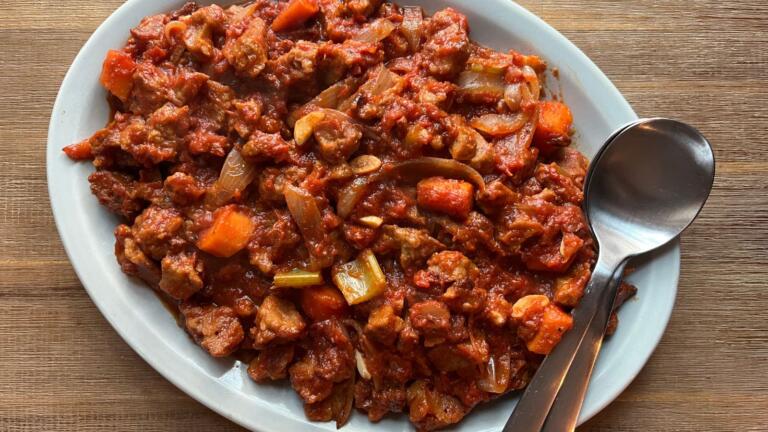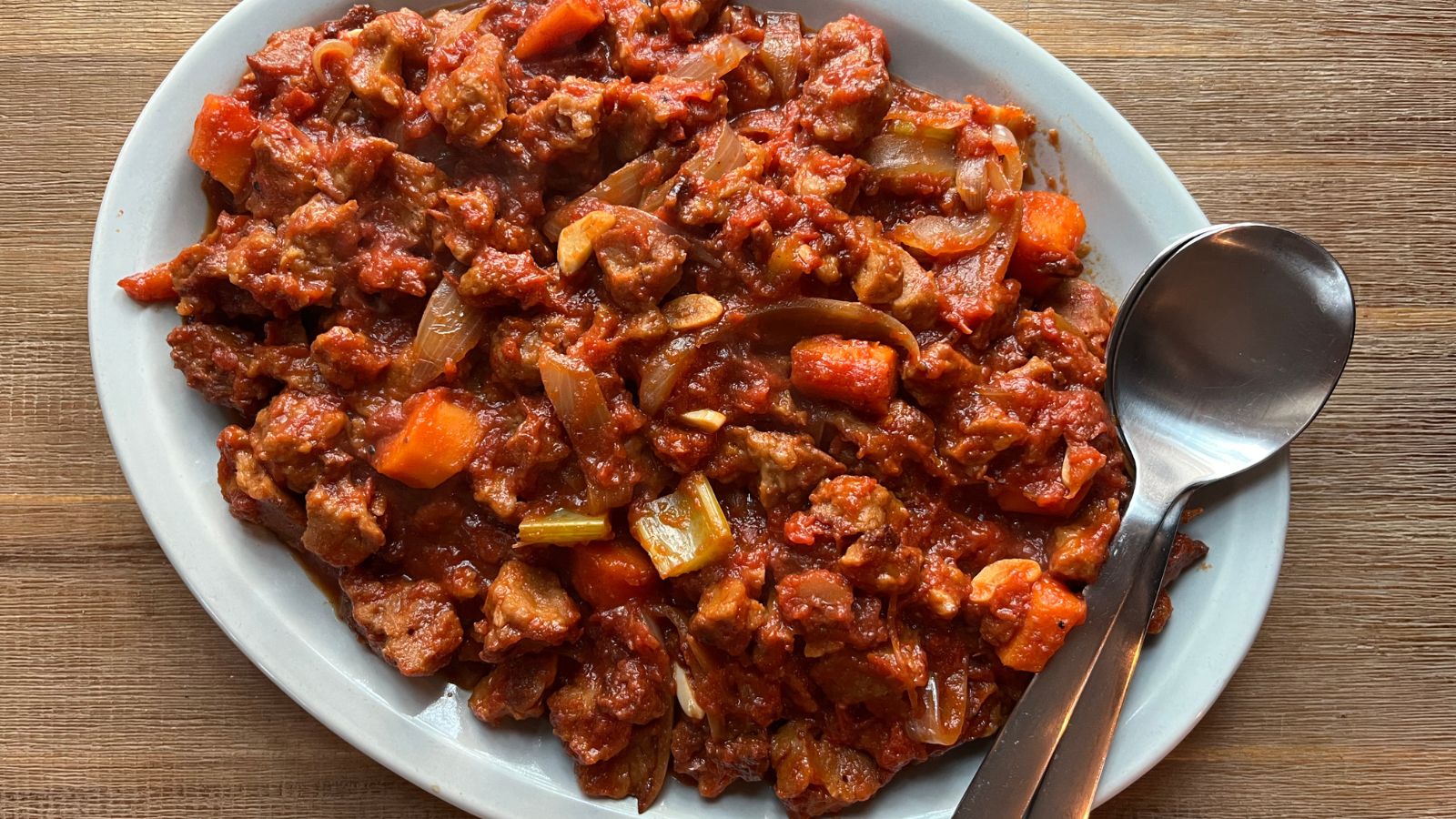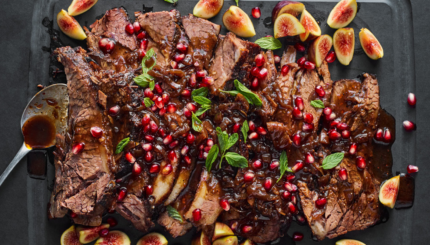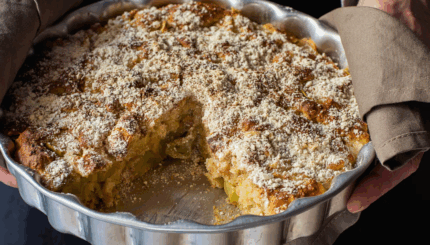Like many Ashkenazi Jews, I grew up believing that my mother made the best brisket in the world. (I still believe that today.) Fragrant, savory and unbelievably tender, it was and continues to be the stuff of holiday memories – and of sneaking back to the fridge at midnight, long after the guests had gone home.
When I decided to become a vegetarian at age 17, I did so with the acute and sorrowful understanding that I was saying goodbye to one of my favorite Jewish dishes. Brisket was such a sacred food to me, I never even considered trying to recreate it for my meat-free lifestyle, until a friend mentioned that he was trying to “perfect his vegetarian brisket.”
Intrigued, I began fiddling with my own version, combining recipes I found online with the tastes I recalled from childhood. While the resulting dish is by no means an exact replica of my mother’s (and I am no longer a vegetarian), it definitely holds its own on the Rosh Hashanah table or at a Purim feast.
Of course, vegetarian brisket is a rather blatant misnomer, because the word brisket specifically refers to a cut of meat (the “flat, boneless, flavorful cut taken from the breast of a steer,” according to Matthew Goodman’s “Jewish Food: The World at Table”). However, over time, the concept of brisket – at least “Jewish brisket” – has become almost interchangeable with its preparation: the searing over high heat and slow braise necessary to soften this tough kosher cut into a steamy pile of juice and meat. In that sense, “brisket” refers not to a particular ingredient, but rather to a method of cooking, and to the noble search for gastro-Jewish nirvana.
The Nosher celebrates the traditions and recipes that have brought Jews together for centuries. Donate today to keep The Nosher's stories and recipes accessible to all.
Seitan, a meat substitute made from wheat, is inherently chewy and tender, so it does not need to stew for as long as traditional brisket. But since your taste buds will quickly become intoxicated by the smell of onions, garlic and tomato wafting from the oven, the quicker cooking time is a blessing.
Note: Store the brisket, covered, in the fridge for up to 5 days.

Saucy Seitan Brisket
- Total Time: 1 hour 20 minutes
- Yield: Serves 6
Ingredients
- ¼ cup + 2 Tbsp sunflower oil (or other neutral vegetable oil), divided
- 3 (8 oz) packages unflavored seitan chunks, drained and cut into bite-size pieces if necessary
- 1 large yellow onion, peeled and cut into 12 wedges through the root
- 2 medium carrots, peeled, halved lengthwise if thick and cut into ½-inch pieces
- 2 celery stalks, halved lengthwise if thick and cut into ½-inch pieces
- 4 garlic cloves, thinly sliced
- 1 (28 oz) can crushed tomatoes
- 1½ cups vegetable broth
- 2 Tbsp tomato paste
- 2 Tbsp brown sugar
- 1 Tbsp balsamic or red wine vinegar
- 1 ½ tsp onion powder
- 1 tsp sweet paprika
- 1 tsp Diamond kosher salt, plus more as needed
- ½ tsp freshly ground black pepper
Instructions
- Preheat the oven to 400˚F. Heat ¼ cup of the oil in a Dutch oven or other large, wide-bottomed pot set over medium-high heat. Add the seitan chunks and cook, stirring occasionally, until golden and crisp, 8-10 minutes. Use a slotted spoon to transfer the seitan to a bowl.
- Add the remaining 2 Tbsp oil to the Dutch oven. Add the onion, carrots and celery, lower the heat to medium and cook, stirring occasionally, until browned and beginning to soften, 8-10 minutes. Add the garlic and cook, stirring, until fragrant, about 1 minute.
- Add the crushed tomatoes, broth, tomato paste, brown sugar, balsamic vinegar, onion powder, paprika, salt and black pepper and stir to combine. Stir in the browned seitan. Bring to a bubble then cover and transfer to the oven. Roast, stirring once or twice, until the vegetables are fully tender and the sauce has thickened, 45-60 minutes.
- Remove from the oven, taste and add more salt if needed. Let sit for 10 minutes, then transfer the seitan and veggies to a serving platter. Spoon the sauce over top and serve hot.
Notes
Store the brisket, covered, in the fridge for up to 5 days.
- Prep Time: 20 minutes
- Cook Time: 60 minutes
- Category: Dinner
- Method: Roasting
- Cuisine: Ashkenazi




Do you add the cooked seitan to the vegetable mixture before putting into the oven? Very unclear.
You do! We have updated the recipe accordingly.
What do you suggest serving it with and sides?
Whatever you like! Check out our list of 39 Rosh Hashanah sides to get inspired.
Would this work in a slow cooker?
This doesn’t need to cook for a long time, like the cut brisket, in order to tenderise, so you don’t really need one! Note this lasts for 5 days in the fridge, so you could make it ahead of time if you’re looking for ways to limit your time in the kitchen on Rosh Hashanah itself.
I have not made this yet, but I am going to make it for tomorrow. My question is, can I prepare the recipe with all the ingredients the day before, and the next day put it in the over to finish roasting?
Can I prepare the food the day before, refrigerator it, then finish the cooking in the over the next day?
I can’t wait to try this recipe for my vegan family.
Thank you
Better to cook it then store the brisket, covered, in the fridge for up to 5 days.